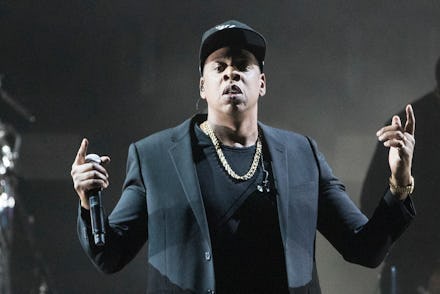Jay-Z's '4:44' isn't just a response to Beyoncé, it's what we love best about hip-hop

Jay-Z’s new album 4:44 is a grown man’s apology — to his aggrieved wife, to his innocent children and to his adoring fans. On his 13th studio album, the king of hip-hop wears his heart on his sleeve and admits all of his sins. He’s doing what good hip-hop always does best by keeping it all the way real, which is no small feat for a black man in America.
Despite all of its braggadocio, rap music has always been the rare space in popular culture where black men can talk honestly about their lives. And like so much of the greatest music, the best truths come out when the genre’s biggest stars are forced to confront their worst enemies: themselves.
Jay-Z takes a hard look in the mirror on 4:44 — and then smashes it to pieces. Yes, the album is a confessional response to Beyoncé’s Lemonade, on which she grappled with his infidelities. But it’s also much more. It’s a promise to himself to become a better man, and a message to his fans that he’s matured. The opening track, “Kill Jay Z,” sets the tone for it all. “You gotta do better, boy, you owe it to Blue,” he raps. That means no more “Big Pimpin’” and womanizing.
On “The Story of O.J.,” he raps over Nina Simone’s “Four Women” about Ezra Edelman’s OJ: Made in America and its claim that Simpson once said, after making his millions, “I’m not black, I’m O.J.” Jay-Z, who’s made millions of dollars of his own, responds, “...OK” and then calls the former football hero a “house nigga.” It’s a moment where the rapper is confessing that as much as he believes in black determination and building black wealth, he’s also aware that he will forever be viewed as a black man in America — a former drug dealer from Marcy Houses in Bed-Stuy, a man who can be celebrated by white society, but never trusted.
And then there’s “Smile,” a song on which Jay-Z opens up publicly about his mother Gloria’s struggle with her sexuality, raising four children while being closeted and finally finding love in the twilight of her life. For a proud representative of a culture that less than a decade ago was scandalized by Terrance Dean’s Hiding in Hip-Hop, which offered up salacious stories of queer identity in rap, Jay-Z presents a watershed moment of acceptance.
Good hip-hop has always been revelatory. Whether it’s narrating tales of hood survival (RIP, Prodigy) or confessing devotion to true love (think Method Man’s “You’re All I Need”), rappers have long used the medium to speak their truths.
One of the most recent and stirring examples of a rapper doing just this was Nas’ 2012 album, Life Is Good. Released in the aftermath of his divorce from R&B star Kelis, Nas set the tone with the album cover, on which he posed in a chair with his ex-wife’s green wedding dress sitting on his lap. One of the album’s standout tracks was “Daughters,” dedicated to his eldest child, Destiny, and his own struggles with fatherhood.
Jay-Z is telling the world that’s he’s struggling, too. Way back in 2003, Jay-Z rapped plenty on his seminal Black Album about being a grown man. But, it turns out, he still had plenty of growing to do — just like all of us. Now, he’s confessing his growing pains — as a husband, a father, and an artist — to the world. And for a black man in his particular position, atop the world’s most popular art form, it’s nothing short of revolutionary.
Mic has ongoing music coverage. Follow our main music hub here.